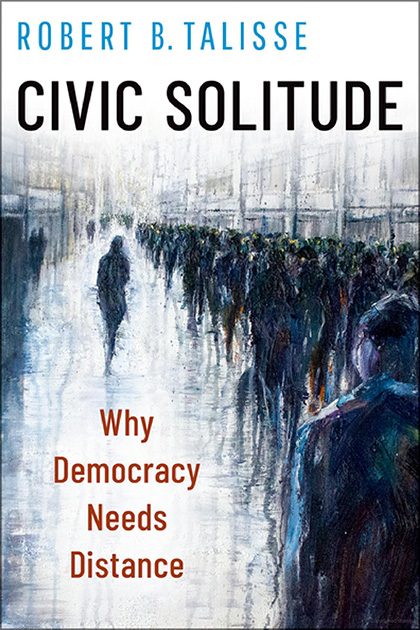Critical Inquiry Critical Inquiry
Robert B. Talisse. Civic Solitude: Why Democracy Needs Distance. New York: Oxford University Press, 2024. 208 pp.
Review by Karl Baldacchino
18 September 2025
When Bowling Alone (2000) was published at the turn of the century, its author, Robert Putnam, argued that American society was undergoing a profound decline in civic engagement, participation in community organizations, and informal social interaction. This retreat from collective life reflected not only a weakening of democracy and social well-being but also a broader pattern of withdrawal, as individuals increasingly disengaged from the bonds and responsibilities that tied them to one another. Fast forward a quarter of a century, and Robert B. Talisse, the author of Civic Solitude: Why Democracy Needs Distance, argues that a very specific type of reflective solitude is “necessary for good citizenship” and the well-being of society in general (p. 2). In contrast to Putnam’s emphasis on the dangers of detachment, Talisse highlights the democratic value of stepping back, cultivating distance, and creating the conditions for more thoughtful civic participation.
In this third installment from a trilogy of books on the subject of democracy, Talisse suggests that “democratic citizens need occasionally to occupy spaces where they can be alone with their thoughts, places where they can engage in a kind of civic reflection that is detached from the fray of partisan political struggles” (p. 3). This call for moments of reflective distance resonates with John Locke’s notion of “indifferency,” as articulated in An Essay Concerning Human Understanding, first published in 1690.[1] “Indifferency,” according to Locke, refers to the capacity to withhold immediate judgment and suspend commitment until one has carefully weighed the available reasons. Just as Locke saw indifferency as essential to the exercise of genuine freedom and rational choice, Talisse envisions civic solitude as enabling citizens to step back from political noise and garner the reflective clarity necessary for responsible democratic engagement.
Talisse emphasizes throughout his book that it “is committed to improving democracy, rather than diluting or abandoning it” (p. 4). He stresses that citizens need not “simple solitude, but civic solitude” (p. 5). Beyond the importance of collective political activity, in chapter 2 Talisse asserts the value of reflective thinking, while in chapter 3 he shows how such reflective capacities can be undermined by collective action, which tends to reinforce an us-versus-them mentality. In his view, what he calls “belief polarization” not only reinforces ideological homogeneity but also heightens antagonism toward political opponents, deepening social and political divides. In chapter 4 some detail is provided on how civic contemplation better manages the “dysfunctions of polarisation” and displaces “the partisan self,” along with ways to find “spaces of solitude” that offer solace and nurture reflection such as parks and museums (pp. 116, 124, 145).
For Talisse, civic solitude is framed primarily in positive terms, emphasized as a valuable resource for democratic life. He does recognize that it is not without drawbacks, yet his discussion tends to minimize these limitations and overlook the more ambivalent dimensions the practice might entail. Such limitations were noted long ago in sociology, most notably in the early twentieth-century work of Georg Simmel, which introduces an important note of ambivalence into the discussion of solitude. For Simmel, solitude was not unconditionally virtuous but a condition marked by tension: on the one hand, it enables individuals to step back from social pressures and cultivate selfhood, and on the other, it risks producing estrangement, detachment, and even forms of social pathology when taken too far. In other words, a blasé attitude may develop, especially within modern urban environments where individuals are incessantly confronted with sensory overload and competing social demands.
Talisse’s underlying argument is that without civic solitude, democratic life is impoverished, as citizens risk becoming unreflective, overly conformist, and vulnerable to the pressures of their respective party lines. Yet this formulation treats solitude almost exclusively as a remedy, overlooking the possibility that solitude itself may generate unintended consequences. In today’s political climate, as we know, withdrawal from mainstream civic life does not simply function as a space for independent reflection. It can rather facilitate the cultivation of resentment and the hardening of oppositional identities. For readers interested in the idea of temporarily stepping back from politics, Talisse’s account of civic solitude offers some useful practical insights. Those seeking a more theoretically expansive treatment, however, would find it in Jeffrey Edward Green’s The Shadow of Unfairness: A Plebeian Theory of Liberal Democracy, which develops a similar notion under the term “extrapoliticism” and traces a long philosophical tradition to show how detachment can serve both as democratic critique and as egalitarian solace.[2]
[1] John Locke, An Essay Concerning Human Understanding, 2 vols. (Oxford,1894): 1:20 n. 3.
[2] See Jeffrey Edward Green, “Solace for the Plebian: The Idea of Extrapoliticism,” The Shadow of Unfairness: A Plebeian Theory of Liberal Democracy. (New York, 2016), pp. 130–64.

